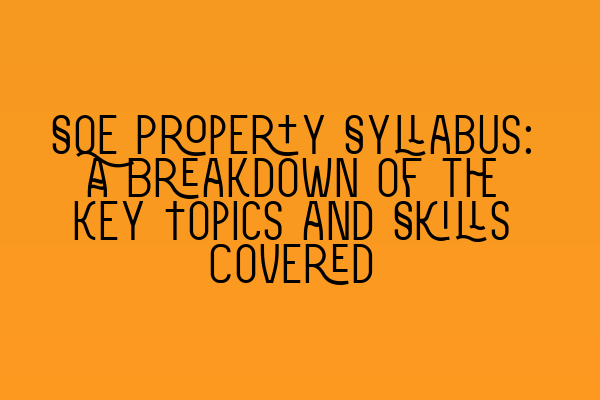SQE Property Syllabus: A Breakdown of the Key Topics and Skills Covered
Welcome to the blog of SQE Property Law & Land Law, your trusted source for all things related to property law. In this article, we will provide a detailed breakdown of the key topics and skills covered in the SQE Property syllabus. Whether you are a law student preparing for the SQE exams or a practicing solicitor looking to enhance your expertise in property law, this article will serve as a comprehensive guide to help you navigate the syllabus and excel in your studies.
Introduction to SQE Property Syllabus
The SQE Property syllabus is designed to equip aspiring solicitors with the essential knowledge and skills required to practice property law effectively. The syllabus covers a wide range of topics, including both substantive law and practical skills, to ensure a well-rounded understanding of property law and its application in real-world scenarios.
Now, let’s dive into the key topics and skills covered in the SQE Property syllabus:
1. Land Law
Land law forms the foundation of property law, and a sound understanding of its principles is crucial for any property lawyer. The SQE syllabus covers various aspects of land law, including:
- Legal estates and legal interests in land
- Equitable interests in land
- Co-ownership and trusts
- Leases and tenancies
- Mortgages and charges
- Adverse possession
For a more in-depth look at land law, you can read our related article: SQE Contract Law: Analyzing Landmark Cases and Influential Judicial Decisions.
2. Conveyancing
Conveyancing is the process of transferring legal title of property from one person to another. The SQE syllabus covers the various stages and considerations involved in the conveyancing process, including:
- Pre-contract enquiries and investigations
- Exchange of contracts
- Completion and post-completion matters
- Registration of title
- Land registration rules and procedures
3. Leases and Tenancies
Leases and tenancies are common in property law, and the SQE syllabus delves into the intricacies of these arrangements, including:
- Types of leases and tenancies
- Creation and termination of leases
- Rights and obligations of landlords and tenants
- Assignment and subletting
- Renewals and rent reviews
- Disrepair and dilapidations
To gain a deeper understanding of lease-related topics, you may find our related article helpful: A Closer Look at SQE Contract Law Syllabus.
4. Real Estate Finance
Real estate finance is a critical aspect of property transactions, and the SQE syllabus covers the principles and practices involved in financing real estate transactions. Key topics in this area include:
- Mortgages and charges
- Remedies for default
- Secured lending
- Capital markets and securitization
5. Landlord and Tenant Law
Landlord and tenant law deals with the rights and obligations of both landlords and tenants. The SQE syllabus explores this area in detail, covering topics such as:
- Tenant rights and responsibilities
- Landlord obligations and duties
- Rent reviews and service charges
- Evictions and possession proceedings
If you’re interested in understanding the ethical dimensions of contracts, you may find our related article insightful: Ethics in Contract Law: Navigating the Moral and Legal Dimensions.
Conclusion
The SQE Property syllabus covers a comprehensive range of topics and skills necessary for a successful career in property law. From land law to conveyancing, leases and tenancies to real estate finance, and landlord and tenant law, the syllabus provides a well-rounded understanding of the complexities and intricacies of property law.
By mastering the key topics and skills covered in the SQE Property syllabus, aspiring solicitors can position themselves as competent and knowledgeable professionals in the field. Continuous learning and staying updated with the latest developments in property law will also be crucial for practicing property lawyers.
For more information about property law and related topics, please explore our website and feel free to reach out to us with any inquiries. Best of luck with your SQE preparations!
